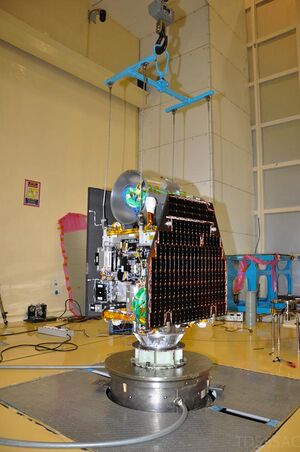Engineering:Microsat (ISRO)
 | |
| Operator | ISRO |
|---|---|
| COSPAR ID | 2018-004T |
| SATCAT no. | 43128 |
| Mission duration | Planned: 10 months Duration: 2 years, 10 months, 15 days |
| Spacecraft properties | |
| Bus | IMS-1 |
| Manufacturer | ISRO |
| Launch mass | 133.2 kilograms (294 lb) |
| Start of mission | |
| Launch date | 12 January 2018 |
| Rocket | PSLV-C40 |
| Launch site | Satish Dhawan Space Centre (Sriharikota) |
| End of mission | |
| Disposal | Orbital decay |
| Decay date | 27 November 2020[1] |
| Orbital parameters | |
| Reference system | Geocentric |
| Regime | Sun-synchronous orbit |
| Periapsis altitude | 350 km (220 mi) |
| Apoapsis altitude | 350 km (220 mi) |
| Inclination | 96.87° |
| Period | 91.5 minutes |
Microsat-TD was an Earth observing satellite developed by ISRO.[2] Its launch marked India's 100 satellites in space.[3] This satellite could capture images at night by imaging in infrared spectrum.[4][5]
Launch
MICROSAT-TD satellite was launched at 0359 UTC on 12 January 2018[6] by PSLV-C40 and its deployment profile was previously rehearsed on PSLV-C38 mission.[7][8] Microsat-TD was launched along with Cartosat-2F, INS-1C and 28 satellites from 6 countries[9] and separated 1 hour 45 minutes after first stage ignition.[10] Duration of PSLV C40 mission was 2 hours and 21 minutes, making it the longest mission of PSLV at that time.
Payload
Microsat-TD was IMS-1 based technology demonstrator carrying optical imaging payload in two bands.[11][12]
- 0.8 meter resolution (panchromatic, 0.5 -0.85 µm) with 3.2 km swath
- 6 meter resolution (IR,3.7-4.8 µm and 8-12 µm) with 2 km swath
End of mission
To reduce its orbital stay, Microsat-TD was de-orbited while depleting its left over propellant near the end of its life. Satellite reentered within a month, on 27 November 2020.[1]
See also
- Microsat-R
References
- ↑ 1.0 1.1 Kumar, Anil. "India's Efforts in Space Debris Management". https://www.unoosa.org/documents/pdf/copuos/stsc/2022/19_INDIA_Item8_Indias_efforts_in_Space_Debris_Management.pdf.
- ↑ "Official page of MICROSAT". ISRO. January 12, 2018. https://www.isro.gov.in/Spacecraft/microsat-0.
- ↑ "ISRO's maiden century". The Hindu. 12 January 2018. http://m.thehindubusinessline.com/news/science/isro-launches-its-100th-satellite-into-space/article10027585.ece.
- ↑ "ISRO's night images". Times of India. 23 January 2018. https://m.timesofindia.com/home/science/isro-releases-images-captured-by-microsat-and-nanosatellite/amp_articleshow/62622667.cms.
- ↑ "Images from INS-1C and Microsat - ISRO". https://www.isro.gov.in/update/23-jan-2018/images-ins-1c-and-microsat.
- ↑ "PSLV Successfully Launches 31 Satellites in a Single Flight - ISRO". https://www.isro.gov.in/update/12-jan-2018/pslv-successfully-launches-31-satellites-single-flight.
- ↑ "ISRO upbeat over PSLV- C38 mission success" (in en-IN). The Hindu. 2017-06-23. ISSN 0971-751X. https://www.thehindu.com/news/national/isro-upbeat-over-pslv-c38-mission-success/article19136971.ece.
- ↑ rajasekhar, pathri (2017-06-20). "Isro to lower rocket's altitude" (in en). http://www.deccanchronicle.com/science/science/200617/isro-to-lower-rockets-altitude.html.
- ↑ "PSLV-C40 Brochure". ISRO. https://www.isro.gov.in/sites/default/files/flipping_book/PSLV-C40_Cartosat2SeriesMission/index.html#3.
- ↑ "Longest PSLV mission". INBA. http://inba.tv/indias-100th-satellite-laucnched-isro/.
- ↑ Annadurai, Mylswami (January 2015). "User Interaction Meet NRSC 2015". http://nrsc.gov.in/pdf/1.1.User%20Meet_NRSC_2015-01-21_Ver-2_Anna_durai.pdf.
- ↑ "Microsat". http://www.isac.gov.in/earth-observation/html/microsat.jsp.
External links
 |


